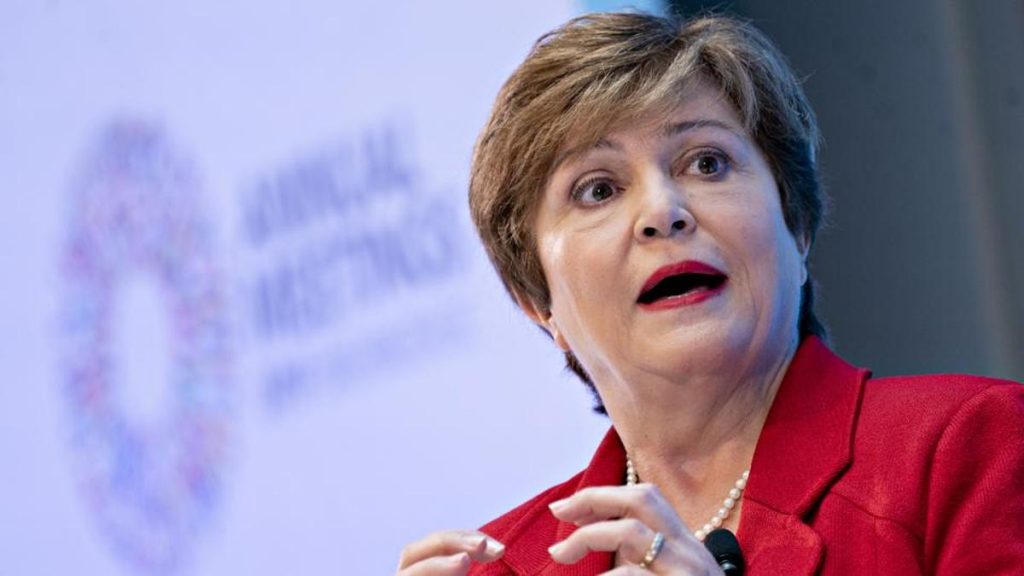Bengaluru: IMF Managing Director Kristalina Georgieva Saturday said there is an urgent need to strengthen the international financial architecture, especially in the area of debt resolution and Global Financial Safety Net at a time when global growth is set to slow in 2023.
Terming India a relative bright spot, she said, it is an important engine of growth for the world economy, representing about 15 per cent of global growth in 2023.
India’s remarkable progress on Digital Public Infrastructure provides a strong basis to secure robust and inclusive growth over the medium term, she said at the first G20 Finance Ministers and Central Bank Governors (FMCBG) meeting under India Presidency here.
“With global growth set to slow in 2023 and remain below its historical average, too many people in too many countries are struggling to make ends meet—a point that I highlighted in my recent blog on policy priorities for G20. The international community, therefore, has a responsibility to come together to find solutions for the most vulnerable members of our global family,” she said.
This calls for urgent action to strengthen the international financial architecture, especially in the area of debt resolution and strengthening Global Financial Safety Net, she added.
Global Financial Safety Net is a set of institutions and mechanisms that provide insurance against crises and financing to mitigate their impact.
In light of rising debt vulnerabilities in many countries, she said, there is a need to strengthen the debt architecture and improve the speed and effectiveness of debt resolution.
Sovereign debt vulnerabilities, already elevated before the pandemic, have been exacerbated by the shocks stemming from Covid-19 and Russia’s war against Ukraine, she said, adding, this is particularly the case for developing and low-income countries with very limited policy space and huge development needs.
It is therefore imperative for G20 to strengthen the debt architecture and G20 did so in 2020 with Debt Service Suspension Initiative (DSSI) and by establishing Common Framework (CF) for debt resolution, she said.
“Since then, the CF delivered a debt operation for Chad. It is now critical to complete Zambia’s debt restructuring, establish a Creditor Committee for Ghana, and advance work with Ethiopia. Nonetheless, more predictable, timely, and orderly processes are needed both for countries under the CF and for those not covered by it, including Sri Lanka and Suriname,” she said.
“This means that we must enhance dialogue and collaboration on debt issues. This is the goal of the new Global Sovereign Debt Roundtable (GSDR): to bring together creditors—official, old and new, and private—and debtor countries to discuss key issues that can facilitate the debt resolution process.
“We launched the GSDR under the auspices of India’s G20 Presidency last week at the deputies’ level, followed by an engaged and constructive principals meeting earlier today. We will further build on this discussion during the World Bank-IMF Spring Meetings in April,” she said.
Being the centre of Global Financial Safety Net, she said IMF has been scaling up lending as members confront the significant economic challenges that the past few years have brought.
In a world of great uncertainty and repeated turbulence, it is critical to further bolster IMF’s capacity to support its members, she said.
“This applies most urgently to our concessional financing for low-income countries through our Poverty Reduction and Growth Facility (PRGT). Demand for PRGT support has reached unprecedented levels and can only be met if matched by an increase in PRGT loan and subsidy resources,” she said.
In addition, she said, a successful quota review—which IMF’s membership has committed to complete by December 2023—is critical for a strong Global Financial Safety Net.
“The latter has always been important for global stability and is even more important in today’s challenging global environment, especially for the most vulnerable countries and people. Our common interest is to secure a well-functioning and integrated global economy, for the sake of a more secure and prosperous world,” she said.
PTI
